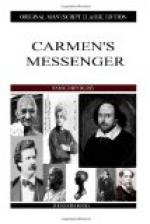After a time he stopped to look about. His view commanded a horizon of two or three miles, for he seemed to be near the center of the tableland. Its surface was broken by the hummocks and hollows of the peat, and tufts of white wild cotton relieved the blackness of the gashes in the soil. Sheep fed in the distance, and he heard the harsh cry of a grouse that skimmed the heath. The skyline was clear, and by and by two sharp but distant figures cut against it.
Foster’s first impulse was to drop into the ling, but he did not. If the men were following him, it would take them half an hour to reach the spot he occupied and, if necessary, the roughness of the ground would enable him to reach the edge of the moor without their seeing which way he went. Besides, since he would be visible as long as he stood up, he could find out whether they were looking for him or not. They came nearer and then vanished, and he sat down and speculated about his line of retreat. Their disappearance was suspicious, and although he thought he could baffle the rural police, it would be different if he had gamekeepers to deal with.
By and by the men reappeared, but as they did not seem anxious to cover their movements he felt relieved. It was possible that they had come to mend a fence or look for some sheep. For all that, he drew back among the hummocks, and looked for hollows where he would have a background for his figure as he resumed his march. He saw no more of the men and by and by came to a burn, which he followed to lower ground, where he found the road Pete had told him about.
It led him up and down hill, and now and then the track was faint, while when he crossed the last ridge the light was fading. Motionless gray clouds stretched across the sky, which glimmered with pale saffron in the west. Rounded hills, stained a deep blue, cut against the light, and a trail of gauzy vapor hung about a distant hollow. Since there was no mist on the moors, he knew it was the smoke of Hawick mills.
As he went down, stone dykes began to straggle up the hill. The fields they enclosed were rushy and dotted with whinns, but they got smoother and presently he came to stubble and belts of plowing. Then he turned into a good road and saw rows of lights that got gradually brighter in the valley ahead. It had been dark some time when he entered Hawick, and the damp air was filled with a thin, smoky haze. Factory windows glimmered in the haze and tall chimneys loomed above the houses. The bustle of the town fell pleasantly but strangely on his ears after the silence of the moors.
Reaching a hotel that looked comfortable, he went in, ordered dinner, and provisionally booked a room, though he did not register and explained that he could not tell yet if he would stay all night. Then, leaving his knapsack, he went into the street and stopped by a bridge where three roads met. A guide-post indicated that one led to Selkirk, and the map had shown Foster that this was the way to Peebles and Yarrow. Another ran up the waterside to Langholm and the south.




